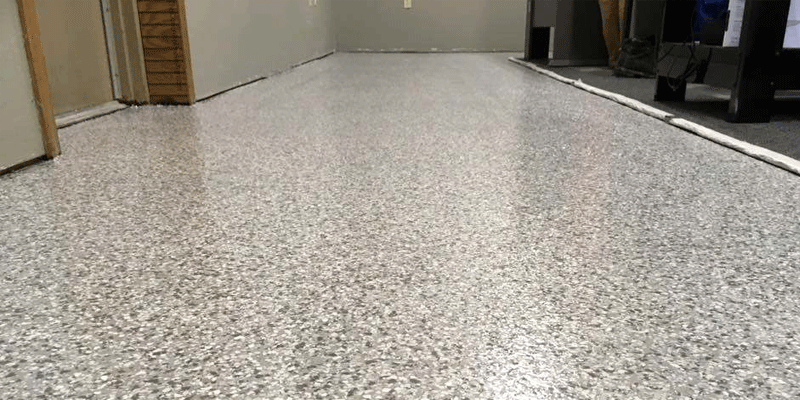
Protective coatings are critical to maintaining the longevity and appearance of surfaces, whether it's a garage floor, commercial kitchen, or even a work of art. With so many options available, it can be challenging to determine which coating material to use. Two standard options are epoxy and traditional coatings, each with unique advantages and disadvantages.
In this article, we will dive into the differences between these two coating materials, examining factors such as durability, ease of application and maintenance, and cost-effectiveness. By the end, you will have a clearer understanding of the pros and cons of each option and be better equipped to decide which coating material is best suited for your specific needs.
Epoxy coatings are a polymer layer material made by mixing epoxy resin and a hardening agent. This mixture creates a durable, thermosetting polymer that can bond strongly with a variety of surfaces, such as concrete, metal, and wood. Epoxy coatings are known for their superior performance and have several advantages over traditional coatings.
One of the primary advantages of epoxy coatings is their exceptional durability and longevity. Epoxy coatings can withstand heavy traffic and resist damage from abrasion, impact, and chemicals. This makes them a popular choice for coating floors, walls, and even machinery in industrial settings.
Epoxy coatings are also relatively easy to apply, making them a popular choice for do-it-yourself (DIY) projects. Epoxy coatings come in various forms, such as liquid, paste, and powder, making them versatile and adaptable to various applications. Additionally, epoxy coatings require minimal maintenance and can be easily cleaned with soap and water.
Traditional coatings are typically made from natural materials such as oil-based paints, acrylics, or alkyds. These coatings have been continuously refined for centuries to improve their performance and versatility.
One of the primary advantages of traditional coatings is their relatively low cost. Compared to some of the more specialized coatings on the market, conventional coatings are often less expensive, making them a popular choice for a variety of applications.
Traditional coatings are also relatively easy to apply, requiring minimal equipment and expertise. They can be applied using a brush, roller, or spray gun, and most can be cleaned up with soap and water.
However, traditional coatings are less durable than epoxy coatings and may require more frequent maintenance to maintain their appearance and performance. They are also more susceptible to abrasion, chemicals, and weathering damage.
When choosing between epoxy and traditional coatings, it's essential to understand the differences between them. Here's a closer look at some of the primary factors to consider:
Durability and longevity:
Epoxy coatings are known for their exceptional durability and longevity, sometimes lasting up to 5-10 years or longer. Traditional coatings are less durable and typically require more frequent maintenance to maintain their appearance and performance.
Resistance to abrasion and chemical damage:
Epoxy coatings are highly resistant to abrasion, chemicals, and impact, making them an excellent choice for high-traffic areas or surfaces exposed to harsh conditions. Traditional coatings are more susceptible to abrasion, chemicals, and weathering damage.
Ease of application and maintenance:
Epoxy coatings require specialized equipment and expertise for proper application, making them more challenging to apply than traditional coatings. However, once applied, they require minimal maintenance. Traditional coatings are easier to apply but may require more frequent maintenance to maintain their appearance and performance.
Appearance and aesthetic appeal:
Epoxy coatings can provide a high-gloss, smooth finish that enhances the aesthetic appeal of a surface. They also come in a wide range of colors and textures, making them ideal for decorative applications. Traditional coatings come in a variety of colors and textures but may not provide the same level of aesthetic appeal as epoxy coatings.
When choosing between epoxy coatings and traditional coatings, there are several factors to consider:
Type of surface being coated: Different surfaces may require different types of coatings. For example, concrete floors may benefit from the durability and chemical resistance of epoxy coatings, while wood furniture may benefit from the versatility and aesthetic appeal of traditional coatings.
Environmental factors: Consider the environment where the coating will be applied, such as temperature, humidity, and exposure to sunlight. Epoxy coatings may be more suitable for outdoor applications as they resist UV rays, while traditional coatings may fade or peel in direct sunlight.
Budget and timeline constraints: Epoxy coatings are generally more expensive than traditional coatings due to the specialized equipment and expertise required for their application. Additionally, they may need longer drying times, which could impact the project's timeline.
Specific requirements for the coating: Consider any specific requirements for the layer, such as color, texture, or sheen. Epoxy coatings offer a wider range of color options and a high-gloss finish, while traditional coatings may offer more texture options.
When choosing between these two coating materials, it's essential to consider the application's specific requirements, as well as budget and timeline constraints. It's also important to consult with a professional to ensure that the coating is applied correctly for maximum performance and longevity.
Epoxy coatings are highly durable and resistant to abrasion and chemicals, making them ideal for high-traffic areas and surfaces exposed to harsh conditions.
Epoxy coatings offer a wide range of color and texture options and are highly versatile.
Traditional coatings are a cost-effective option for applications where durability and chemical resistance are less critical and where a wide range of color options is desired.
Traditional coatings are easier to apply but may require frequent maintenance to maintain appearance and performance.
Consider factors such as the coated surface type, environmental factors, budget and timeline constraints, and specific requirements for the coating when choosing between epoxy coatings and traditional coatings.
Call Us Now: 714-844-0262